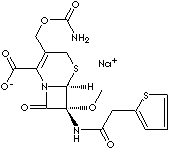
Cefoxitin Sodium

CAS NO. 35607-66-0 (Base)
33564-30-6 (Sodium)
CEFOXITIN SODIUM
EINECS NO. 252-641-2, 251-574-6
FORMULA C16H17N3O7S2·Na
MOL WT. 449.44
CLASSIFICATION
ANTIBOITICS / CEPHALOSPORINS /
PHYSICAL AND CHEMICAL PROPERTIES
PHYSICAL STATE White to off-white crystalline powder
MELTING POINT
BOILING POINT
SPECIFIC GRAVITY
SOLUBILITY IN WATER
STABILITY Stable under ordinary conditions.
GENERAL DESCRIPTION & APPLICATIONS
Cefoxitin Sodium: a broad range of gram-positive and gram-negative
second generation cephalosporins with resistance to beta-lactamase;
administered intramuscularly or intravenously. Chemical designation is
Monosodium
(6R-cis)-3-[(carbamoyloxy)methyl]-7-methoxy-8-oxo-7-(2-thienylacetamido)-5-thia-1-
azabicyclo[4.2.0]oct-2-ene-2-carboxylate.
Cephalosporin: any of a group of broad-spectrum derived from species of
fungi of the genus Cephalosporium and are related to the penicillins in
both structure and mode of action but relatively penicillinase-resistant
antibiotics. These antibiotics have low toxicity for the host,
considering their broad antibacterial spectrum.
They have the active nucleus of beta-lactam ring which results in a
variety of antibacterial and pharmacologic characteristics when modified
mainly by substitution at 3 and 7 positions. Their antibacterial
activities result from the inhibition of mucopeptide synthesis in the
cell wall. They are widely used to treat gonorrhea, meningitis,
pneumococcal, staphylococcal and streptococcal infections.
The cephalosporin class of antibiotics is usually divided into
generations by their antimicrobial properties. Three generations of
cephalosporins are recognized and the fourth has been grouped.
Each newer generation of cephalosporins has broader range of activity
against gram-negative organisms but a narrower range of activity against
gram-positive organisms than the preceding generation.
The newer agents have much longer half-lives resulting in the decrease
of dosing frequency. Accordingly, the third-generation cephalosporins
can penetrate into tissues well, and thus antibiotic levels are good in
various body fluids.
Chemistry - Actually a cephamycin, cefoxitin sodium is a semisynthetic
antibiotic that is derived from cephamycin C which is produced by
Streptomyces lactamdurans. It occurs as a white to off-white, somewhat
hygroscopic powder or granules with a slight characteristic odor. It is
very soluble in water and slightly soluble in alcohol. Each gram of
cefoxitin sodium contains 2.3 mEq of sodium.
Storage/Stability/Compatibility - Cefoxitin sodium powder for injection
should be stored at temperatures less than 30°C and should not be
exposed to temperatures greater than 50°C. The frozen solution for
injection should be stored at temperatures no higher than -20°C.
|
|








